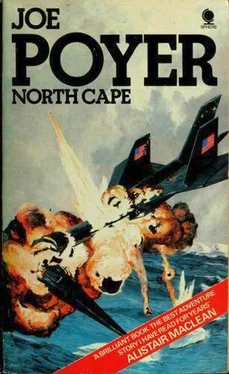Thoughtfully, Major Joseph Teleman turned to the never-beforeused direct line communication channel to his headquarters, nestled deep in the soft Virginia hills, and began composing the message that would shake one of the most vital, least known, and smallest portions of the United States military establishment.
The dead, coppery sun dragged itself out of the heaving ocean and hung sullenly against the slate sky. Folsom had never seen a — sunrise that boded so ill for the day to come. The sun was merely a not overly bright ball, shrouded in layers of ice. Its light was as dull and washed out as the running seas around and gave no warmth at all, real or imagined, to the scene over which it presided. Folsom stamped his feet on the caked ice of the bridge deck and swore under his breath. The RFK was shrouded in a more substantial ice than was the sun. So much more substantial that she was riding noticeably lower in the water. The deck heaters had been running at full power all night and the interior of the hull was unbelievably hot. But even heaters that piped waste heat directly from the nuclear reactor heat exchangers had not been sufficient to cope with an Arctic storm of such magnitude.
The dry-bulb temperature showed only eight degrees below zero, not enough to freeze sea water. But the anemometer, clacking on the masthead like something possessed, gave the answer. Wind speed was averaging close to fifty-seven knots, a Force 11 wind on the Beaufort scale. And below zero, for every mile of wind speed, you add another degree below freezing to the apparent temperature to obtain the true temperature. The true temperature was -33°F. Even swathed from head to foot in his heated Arctic gear and wearing double-insulated and heated boots, Folsom was half frozen. The wind was strong enough to tear the crests off the long swells and fling them back as ice that froze solidly into place the moment it touched the ship.
Ahead of the ship, the wind-whipped swells, with their lashing crests of white water, built in slow succession to inundate the decks as the RFK crested wave after wave. Folsom periodically ducked behind the windscreen to escape the cascades of wafer that poured over the bridge deck — in spite of its being forty feet above the water line — and left the deck plates slippery with sea water and ice.
After fifteen minutes on deck, Folsom was finally driven back inside, where he stood gasping for air in the sudden 105° temperature change. He shed his foul-weather gear and climbed into his high seat. The height of the storm was still to be met in approximately four hours. By then the short Arctic day would be long over and the impenetrable blackness would have closed in. The previous night there had been a sky glow through the scudding clouds, but tonight there would be only the black of the deepest pits of hell. The ice layer had thickened above forty thousand feet and the first tinges of storm clouds bearing the blizzard that always followed a katabatic storm were beginning to appear. Folsom did not like this storm or the way it was progressing. Already it was well on the way to becoming one of the worst ever recorded. With a whole ship he would not have been concerned, but the bow section shore-up job was beginning to show signs of strain. He did not know how many more hours of pounding it would take before seams started to open. And open seams in these seas would be disastrous. With a long sigh, Folsom heaved himself out of the high seat and left the bridge. As he passed out of the hatch he picked up the flashlight racked beside the coating and stuck it into his pocket. The bow areas of the ship were deserted. The captain had ordered all but the forward missile rooms and the communication station to shift operations aft. It took Folsom several minutes to reach the forward compartments. Each hatch had to be unsealed, then resealed again. The closer he moved to the outer hull, the louder became the tympanic roar of metal flexing under great strain. The seas were running so heavily that even below the water line, as he was, the outer plates near the bow were flexing in the wind and swells each time the forefoot lifted above the waves. Folsom unsealed the last hatch into the ballast spaces between the ship’s interior and exterior hulls. The ballast water had all been pumped out forward to raise the bow under its coating of ice and force the stern down farther, where the great engines could maintain a continual purchase on the water. In these winds, even a moment with the four screws out of water could find the battle cruiser being spun wildly by the winds, broadside to the waves. Once allowed to start, even a 16,500-ton battle cruiser could be tumbled over beams end, turned turtle, and sunk.
The ballast tank was ice cold. Traces of water remaining after the pumping had frozen to a smooth glaze on bulkheads and deck. Folsom had to hang onto the metal rungs spaced in even rows along the side and bottom to cross the eight-foot space that separated the two hulls.
The outside of the ballast tanks acted as an integral part of the hull. The tank itself was crisscrossed with steel bracing bars. Folsom stood up gingerly, riding with the slow rise and fall of the ship, and flicked on the flashlight. The strong beam sprang out boldly in the wet air, striking the ice-and water-coated sides of the tank to flash back as sparkles from millions of diamonds. He played the beam along the tank wall until he found the eight-foot-long gash, high up above the water line. Carefully he examined the steel plates that had been welded over the gash, checking for signs of water seepage. He could find no major breaks, and with the ice and dampness it was impossible to spot small leaks.
Folsom stood uncertainly below the welded plates, playing the light around the sides of the tank. He would have felt much better if he dared order the tank flooded to capacity with sea water. Filling the tank would have eased the strain on the welded joints. But it might also put them far enough down into the waves so that they would never recover. Finally, after a long minute of helplessness coupled with frustration, he shrugged and turned back to the hatch, clicking off the light. Folsom carefully dogged the hatch shut and then made his way aft to the engine room, amidships.
Although the Robert F. Kennedy displaced 16,500 tons and was nearly seven hundred feet long, she carried a crew of only eighty men. With the ship standing to general quarters in the storm, most of this minimum crew was on duty or else snatching a few hours of restless sleep in the duty bunks scattered around the ship. A powered elevator took Folsom down to G deck and he walked aft another hundred feet, pushed open the engine-room hatch, and stepped into the softly lit, instrument-paneled room. The duty chief nodded to him and came over as he approached the master control panel.
“What’s she look like outside, Commander?” Lieutenant Charles Barrows grinned as Folsom slumped down into the extra command seat.
“Rough. The seas are running better than fifty feet right now. How are your engines doing?”
“Better question would be how’s the hull doing.”
Folsom grinned. “I guess-it would be at that. I was just up there. So far no sign of any separation and no seepage… but, I don’t know.”
Barrows nodded slowly. “How about if I send a couple of boys up to put in some strain gauges, wired to the control room. Shouldn’t take more than an hour or so.” Folsom nodded. “Good. That’s really what I came down here to see about. By the way, how is the overhaul on number three free turbine coming along?” Barrows turned and reached across the console for a check list and leafed quickly through the pages. “They are reassembling the bearings now. Should have it all back together and checked out in twelve hours.”
Читать дальше












